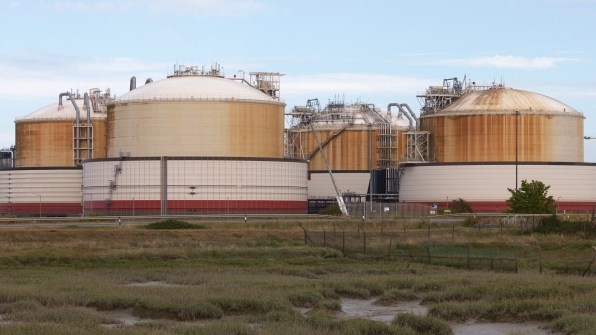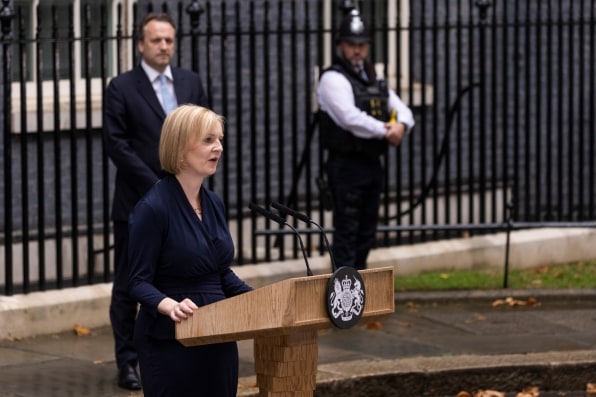On a Monday segment of ITV’s This Morning, a popular British morning show, the cheery hosts spun a Wheel of Fortune-esque disk. They were choosing the fortune of a caller, who would receive a cash prize—or have his energy bills covered for the following four months. “It’s absolutely murder,” the caller said of his bills. After the hosts counted down (“da, da, da, da!”) the man was relieved when the pointer landed on “energy bills.”
Distressed viewers took to Twitter to describe the segment as “dystopian,” and like a real-life episode of Black Mirror. “I’m disgusted that @thismorning have used people being unable to afford their energy bills as some kind of twisted game show,” one tweeted. Another wrote it was a sign of what a “dire state” the country is in.
#ThisMorning has turned completely dystopian and Black Mirror by offering to pay energy bills as a competition prize. pic.twitter.com/hs1DD6NXbo
— Scott Bryan (@scottygb) September 5, 2022
The segment resonated with viewers especially strongly because of Britain’s soaring energy costs. With the end of COVID-19 lockdowns and the continuing war in Ukraine, wholesale gas prices have surged to unprecedented levels, placing the financial burden on consumers. And as winter approaches, people fear they’ll freeze or have to decide between keeping their families warm or fed.
All eyes are on Liz Truss. The incoming prime minister announced today an updated cap on the amount that electricity and gas suppliers can charge customers; the government will then pay the rest, which will keep energy suppliers afloat. But even the cap is too high for a large number of the general public to afford.
Energy costs in the U.K. have surged since last year. As people emerged from pandemic lockdowns, returning to work, school, and travel, the increased activity drove up wholesale gas prices. Russia has also been blocking gas exports as a result of its invasion of Ukraine, which has lowered the supply for European countries that rely on it.
Though the U.K. imports less than 4% of its gas from Russia, the block has a cumulative effect, with heavily reliant countries like Germany—which depends on Russia for 55% of its supply—now getting more from Norway, which is Britain’s primary source.
The U.K.’s energy availability outlook isn’t quite as bad as that of Germany, which is looking to ration gas supplies this winter. “We’re not seeing quite the same threat in the U.K.,” says Jamie Stewart, deputy director at the Centre for Energy Policy at Strathclyde University. “We are seeing the impact of higher prices.”
The U.K. depends more on gas generally, because the country has fewer coal and nuclear plants. Some 85% of British households rely on gas for heating, more than any nation in Europe except Italy, which creates a pressure on gas prices.
Today, as part of an energy policy package, new Prime Minister Liz Truss announced measures intended to increase domestic gas supply, including lifting a fracking ban imposed in 2019 and issuing more than 100 new licenses for North Sea drilling.

[Photo: Dan Kitwood/Getty Images]
The emergency is leading a significant portion of the population into fuel poverty, where households dip below the poverty line after they pay their energy bills. The average number of fuel-poor households is now at 6.7 million, up from 3.2 million in 2020. The crisis is hitting the poorest and oldest hardest, who are paying anywhere from 2,100 pounds to 2,800 pounds (roughly $2,400 to $3,200) extra per year on energy.
According to the International Monetary Fund, the poorest 10% of households will spend 17.8% of their budget on energy in 2022, compared to 6.1% for the richest 10%, representing the greatest disparity in Western Europe.
The U.K.’s National Health Service has warned of a “humanitarian crisis” for the poor and the elderly, anticipating a winter of excess illnesses and deaths from freezing.
There’s been an increase in the use of food banks, because people can’t afford both food and energy. Bristol is planning to set up communal “warm places” for those who don’t have heating at home. And on The Guardian’s Today in Focus podcast, a guest told a story of a resident having to ask a neighbor to dangle a single electrical socket into their apartment so they could use electricity (until the neighbor couldn’t afford it, either).
Britain’s energy system has been privatized since 1990, under then-Prime Minister Margaret Thatcher. As wholesale gas prices have skyrocketed, smaller energy companies have been forced out of the market; 31 have gone bust since the start of 2021.
“They basically weren’t financially resilient enough to weather any storm,” Stewart says. “Consumers are basically covering the cost of those suppliers going out of business.”
But there is a government energy regulator called Ofgem (Office of Gas and Electricity Markets). Every quarter, it establishes a “price cap” to modulate the profit that energy companies can make. It’s a limit on how much retailers can charge households, based on an average home’s bill.
But it’s ultimately based on cost per unit, not on the total usage—so, if your household uses a lot more energy, your bills would still be higher than the cap. And it’s often the vulnerable who have to use more power: disabled people who may need to keep certain appliances running, or people with poor insulation in cold and wet regions. More than half of British homes leak energy.

[Photo: Dan Kitwood/Getty Images]
Still, it’s a helpful intervention, because without it, as gas prices keep shooting up, unchecked prices would spiral out of control. The cap currently stands at 1,971 pounds (more than $2,200) a year, the highest ever recorded. As part of her policy package, Truss today announced a new cap of 2,500 pounds (more than $2,800) to go into effect on October 1 for two years. The government will cover everything above that threshold, keeping energy suppliers in business.
“The government is basically taking on the loss that the company will make by charging the cap of 2,500 pounds,” Stewart explains.
While the cap is technically higher than it has been, the fact that it will be in place for two years is a win for residents, who otherwise would have been the cap nearly double in October.
Still, some think the 2,500 figure is still too high. “I would have liked to see it lower than it is,” Stewart says. For these reasons, there is a demand for stimulus grants to help tide people over, similar to pandemic payments, where the U.K. government subsidized 80% of furloughed workers’ pay for more than a year.
“The cap does probably do its job for the majority of society,” Stewart says. “But there will still be particularly vulnerable households that will need more protection.”
In the summer, Johnson’s government announced 400-pound (roughly $460) universal grants to help people pay their energy bills, which will be distributed this winter. But they are paltry compared to the COVID-19 subsidies—even though the energy package in its entirety is expected to cost the government more than its coronavirus measures. “It was always feared that that wouldn’t be enough,” Stewart says.
But with the ever-rising costs, time will tell whether any subsidy will prove sufficient. Or whether desperate individuals will have to turn to dystopian TV gimmicks to stay afloat.
(57)